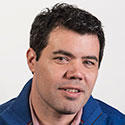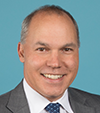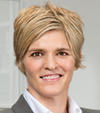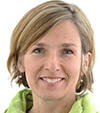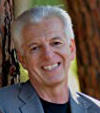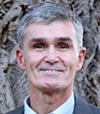To mark the 50th anniversary of Earth Day, April 22, 2020, the McFarland Center is pleased to share a playlist of lectures of the last decade exploring the ethics of environmental policy and actions, biodiversity, and climate change.
Videos to Watch Online
Fishbowl Discussion: Greening Cities from Plan to Practice
April 6, 2022
With Green Worcester as a springboard for conversation, this discussion looks at the environmental planning process and what happens when competing ethical interests come into play. Featuring John Fernández, professor of architecture and director of the Environmental Solutions Initiative at MIT; Karin Valentine Goins, program director of Preventative and Behavioral Medicine at University of Massachusetts Medical School and co-founder of WalkBike Worcester, and John Odell '88, chief sustainability and resilience officer for the City of Worcester. Co-sponsored with the Office of Sustainability.
Chris Mooney | Revealing the Truth about the World's Greenhouse Gas Emissions
February 1, 2022
Chris Mooney, a Pulitzer Prize-winning journalist with the Washington Post and a lecturer at Yale School of the Environment, describes his months-long investigation into the world’s climate-warming emissions, which found that countries are dramatically under-reporting their climate impact—by as much as 13 billion tons of greenhouse gases annually. Co-sponsored with Environmental Studies.
Joseph Aldy | Saving the Planet Cost-Effectively
February 17, 2021
Joseph Aldy, Professor of the Practice of Public Policy at the Harvard Kennedy School, draws from the theory and practice of carbon pricing and pollution markets to explain how it works around the world and to explore the potential design of U.S. climate change policy.
Jody Freeman | Climate Change and the Energy Transition: What’s at Stake this November
October 14, 2020
Jody Freeman, Archibald Cox Professor of Law at Harvard University and founding director of the Harvard Law School Environmental Law and Policy Program, reviews where we are in addressing climate change, where we need to be, and what’s at stake in the November 2020 elections.
Thea Riofrancos | A Green New Deal for Climate Safety and Social Justice
February 13, 2020
Thea Riofrancos, assistant professor of political science at Providence College, is coauthor of “A Planet to Win: Why We Need a Green New Deal“ (Verso, 2019). In this talk, she outlines the environmental and social justice goals of the Green New Deal and suggests why it responds better to the challenges of climate change than other current and prior administrations' policies.
Fishbowl Discussion: The Uninhabitable Earth
October 21, 2019
In his best-selling book, "The Uninhabitable Earth: Life after Warming," David Wallace-Wells paints a stark, even apocalyptic portrait of the future. This discussion—led by Holy Cross faculty Kendy Hess, philosophy; Ellis Jones, sociology; Katherine Kiel, economics; and Sara Mitchell, geology; with Renee LeBlanc '21, co-chair of EcoAction—summarizes and assesses the claims made in the book, reflects on how to sustain hope under such challenging circumstances, and asks how we should live in light of what's predicted. McFarland Center Director Thomas M. Landy moderates. Co-sponsored with Environmental Studies and the Class Deans.
Erika Spanger-Siegfried | Killer Heat in the United States: Climate Choices and the Future of Dangerously Hot Days
September 10, 2019
Erika Spanger-Siegfried, lead climate analyst for the Union of Concerned Scientists, shares data from UCS's recent report on "Killer Heat in the United States." In her remarks and an extended Q & A, she describes action needed to both curb global warming and mitigate its impacts. Co-sponsored with Sociology and Anthropology, Environmental Studies, and the Office of Class Deans.
Thomas White '69 | Dolphins, Captivity, and the Challenge of Interspecies Ethics
November 15, 2018
Holy Cross alumnus Thomas I. White '69 has focused his research over the last three decades on the ethical implications of our interactions with dolphins. He argues that dolphins and other cetaceans deserve personhood and that keeping them in captivity is unethical and harms their ability to flourish. White is former Conrad N. Hilton Professor in Business Ethics and Director of the Center for Ethics and Business at Loyola Marymount University and author of "In Defense of Dolphins: A New Moral Frontier."
Richard Higgins '74 | 'Blown on by God's Breath': The Riddle of Thoreau's Religion
October 17, 2017
Holy Cross alumnus Richard Higgins '74, author of "Thoreau and the Language of Trees," explores Thoreau’s misunderstood religiosity and his perception of the divine in nature. A Boston Globe writer for 20 years, Higgins is coauthor of "Portfolio Life" and the editor of four books on religion.
Kevin Esvelt | When Should We Edit Nature? Moral Questions Raised by Gene Drive Research
October 16, 2017
Kevin Esvelt, assistant professor of media arts and sciences and director of the Sculpting Evolution Group at MIT, explains the technology he developed to alter the DNA of wild populations with the potential to save millions of lives and advocates for the practice of open and responsive science in determining how and when to use it.
Pope Francis on the Globalization of Environmental Responsibility | Perspectives of Holy Cross Faculty
September 21, 2015
In anticipation of Pope Francis' historic U.S. visit, a panel of Holy Cross faculty members share interdisciplinary responses to his encyclical letter, "Laudato Si': On Care for Our Common Home," released in May 2015. Panelists include: Kelly Wolfe-Bellin, director of biology laboratories and lecturer in biology; Rev. Thomas Worcester, S.J., professor of history; Matthew Eggemeier, associate professor of religious studies; Katherine Kiel, professor and chair of economics and accounting; and Daina Harvey, assistant professor of sociology and anthropology. Loren Cass, professor of political science and director of the Center for Interdisciplinary Studies, moderates.
Julia Finomo | The Cost-Benefit Analysis of Oil Drilling in the Niger Delta: An Ethical Perspective
September 12, 2013
Environmental ethicist Julia Finomo, a native of the Niger Delta and lecturer at the University of Port Harcourt, Nigeria, describes the environmental degradation due to oil drilling and gas flaring in the Niger Delta region since 1956. Slack practices of multinational oil companies have led to losses of health and livelihood for Niger Delta natives. Finomo advocates for an ecological solidarity among the oil companies, the Nigerian government and the local people to find a path to sustainability.
Juliet Schor | Climate Responsibility and New Cultures of Consumption
April 17, 2013
Professor of sociology at Boston College and former associate professor of economics at Harvard University, Juliet Schor is working on issues of sustainable consumption and production, with particular emphasis on political consumption, new patterns of time-use, and alternative economic structures. As a member of a MacArthur Research Network she is studying the emergence of collaborative consumption, the re-use and sharing of local resources. Co-sponsored by Sociology and Anthropology, the McFarland Center, and Montserrat.
Listen and Learn on iTunes
In Our Lifetimes: Environmental Change and Stewardship
Audio of lectures from this 2010-2011 series is accessible free on iTunes, including:
- Bill McKibben — Past the Tipping Point: The global fight for a stable climate
- Sr. Elizabeth Johnson — An Ecological Inquiry: Jesus and the Cosmos
- Steven Solomon — When the Well Runs Dry: Finding Solutions for the Freshwater Crisis
- John Cannon and Katherine Kiel — Saving the Environment: What Might Have to Change at Holy Cross
- Kieran Suckling '88 — The Biodiversity Crisis: Why Driving Species Extinct Makes Us Less Human
The Challenge of Climate Change
William D. Nordhaus, Sterling professor of economics at Yale University and winner of a 2018 Nobel Prize, is one of the main economists working on models that address the true cost of climate change. He spoke about it at Holy Cross in the fall of 2009.
Listen to William Nordhaus's lecture on iTunes»


